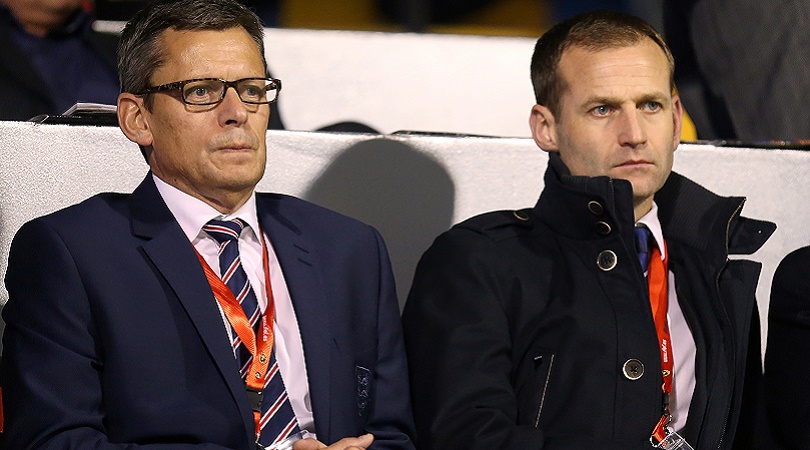Former Everton youth coach Tosh Farrell: "The FA are letting English football down"
Richard Edwards chats to the Toffees' ex-technical coordinator about coaching, young players and the Three Lions' failings

There's been plenty of talk of identity when it comes to the England national team in recent seasons, with the FA proudly trumpeting the country’s footballing DNA since its launch in December 2014.
When Roy Hodgson's side were sent packing from the European Championship by tiny Iceland in the summer, it confirmed what most football supporters in England already knew: losing had become part of the national team’s genetic makeup.
With a dwindling number of players to pick from, the task of managing England has become an even more thankless task than it was when the likes of Sir Bobby Robson, Glenn Hoddle and Kevin Keegan attempted to bring success to a nation starved of it since 1966.
One leading coach, though, believes that the edicts detailed in the FA’s plans are doing more harm than good.
Bleak future?
The coaches who are there to nurture talent are now being asked to deliver courses that they don’t believe in. How can that be successful?
Tosh Farrell is the former technical coordinator and head of international football development at Everton. During his time at Goodison Park, he played a role in the development of Wayne Rooney, Ross Barkley and Jack Rodwell.
Still widely regarded as one of the country’s foremost youth coaches, Farrell’s frustration at the direction coaching in this country is taking is palpable. Bristling with a mixture of enthusiasm, passion and exasperation, he tells FFT that English football is in danger of missing out on an entire generation of players and warns that when some of the country’s most senior coaches retire, the void may remain forever unfilled.
Get FourFourTwo Newsletter
The best features, fun and footballing quizzes, straight to your inbox every week.
“It’s unbelievable, from where I’m standing it disillusions you a little bit,” he says. “The coaches who are there to nurture talent are now being asked to deliver courses that they don’t believe in. How can that be successful? You’ve got a DNA but no-one can tell you what it is or what they’re trying to do. The FA are trying to instruct club coaches on how to develop players. How can they do it when it’s the duty of the academies?”

Successful academies
Farrell points to Spurs and Southampton and their ability to buck the trend when it comes to bringing through players
Farrell points to the excellent, but in many ways isolated, examples of clubs such as Tottenham and Southampton and their ability to buck the trend when it comes to bringing through players.
Luke Shaw, Harry Kane, Calum Chambers and Ryan Mason have all progressed from both clubs’ youth ranks to represent their country in recent seasons – a demonstration of the opportunities available to youngsters at St Mary’s and White Hart Lane that are denied to many others elsewhere.
“Over the last two or three seasons these two would be the most prolific when it comes to developing young players,” he says. “It’s no coincidence that the people guiding these players are from the older brigade of coaches and came through in the same era I did.”

Coaching is key
Clubs can’t be blamed for taking a quick fix rather than taking a chance on an 18-, 19- or 20-year-old who isn't the finished article
Farrell's referring to John McDermott, Spurs’ academy manager and head of coaching, and Martin Hunter, Southampton’s technical director. Alex Gibson, who brought through Shaun Wright-Phillips and Michael Johnson, who left Manchester City in 2010, also gets a namecheck.
“The experience and expertise that these people have is being directed at a minority, which is entirely understandable because they’re doing their best for the clubs that pay their wages,” says Farrell. “But the country needs the best out of Martin Hunter and these other coaches - as coaches we should be able to access the information that years of experience that these guys have. We’re now told that the teacher is the game – it’s like being given a test paper without any revision. It’s just a nonsense.”
Farrell points to the example of Middlesbrough midfielder Adam Forshaw, who was recently tipped for an England call-up, as a perfect illustration of the players England might be missing out on. Forshaw was almost ditched by Everton during his time at the club’s academy before leaving Goodison Park at the age of 20 to try his luck elsewhere; after spells at Brentford and Wigan, Forshaw was signed by Boro boss Aitor Karanka and is now a Premier League regular.

The midfielder showed the mental fortitude to rebuild his career and took a chance that's paid off handsomely. Countless others, though, might have taken an entirely different route after finding their path to the first team blocked. With the amount of cash now swilling around the Premier League, clubs can’t be blamed for taking a quick fix rather than taking a chance on an 18-, 19- or 20-year-old who isn't the finished article.
Backward steps
Not many members of the current England side would have made it into the team that reached a World Cup semi-final in 1990, for example
“How many players of Adam Forshaw’s calibre are being overlooked and released because clubs are going out and spending money that, in reality, they don’t have to spend?” Farrell wonders.
“Once you're released it’s a mental battle as much as anything. It’s a lifestyle change as much as anything. Take these young kids at Premier League club – they’re being treated like lords at the age of 11. You’ve got agents involved, you’ve got kids being shipped around – it’s obscene.”
Some will argue that England players in the modern era must be better than those who have gone before because of the increased competition in the Premier League today. A look at the squad selected to face Scotland and Spain in the coming days hardly bears that out, however: not many members of the current side would have made it into the team that reached a World Cup semi-final in 1990, for example.

FA responsible
For Farrell the blame for the chronic lack of players can be linked directly to the number and quality of coaches coming through the system.
“Players now have to be improved technically even further than when I was involved but if the coach education programme was bringing the coaches up as well as we’re trying to bring up the players that would surely just go cap in hand,” he says.
“I put the blame right at the foot at the FA. Coaches aren't equipped to deal with potentially elite players. They let them play because they can play, they don’t look to improve on what they can do. The information is being filtered down. The number of homegrown players is going to keep going down.”
And no matter how hungry the FA is for success, that’s the unpalatable truth.
New features every day on FourFourTwo.com • Click here for more England content

